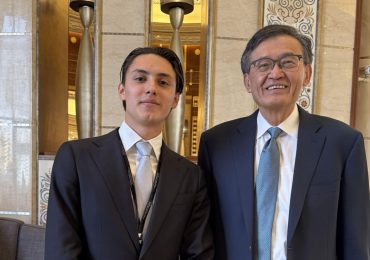Photo Courtesy of: Ximena Zermeño
There is a kind of inheritance that rarely comes in a will—passed not in gold or land, but in silence. For generations, people, especially women, have been conditioned to wait. To be chosen. To find meaning in another’s gaze, and value in another’s vow. The language of love was built around union, and union was always built around sacrifice. Not necessarily mutual. Not always fair.
But what happens when someone breaks from that lineage? Not in defiance, but in devotion—to themselves?
Ximena Zermeño, a former criminal defense attorney who transitioned into a globally recognized destination wedding photographer, stood on a beach in Los Cabos and married herself. No irony. No apology. After a decade of photographing more than 700 weddings across the world, she chose to become the subject of her own ceremony. She wore white. She held her son’s hand. She sang instead of danced. And then she vowed, aloud, to “never abandon myself again.”
It was not an act of ego. It was the start of a movement.
Choosing Yourself Is Not a Rebellion—It’s a Return and a Revolution
Marry Yourself Worldwide is the name of the global movement she launched following that ceremony. It’s less a business and more a reckoning. The idea is simple, and therefore radical: before you promise yourself to anyone else, promise yourself to yourself. That vow, Ximena argues, is not a substitute for love or a rejection of marriage—it is the foundation upon which all other love can be built.
The ceremonies are symbolic, sometimes public, often sacred. People write vows. They choose locations that hold personal meaning. Instead of rings, they wear the Vita necklace—an original design created by Ximena herself. Shaped like a vulva and worn close to the heart, it symbolizes rebirth, wholeness, and self-devotion. Some walk into ceremonies holding hands with their children. Some walk in alone. All walk out changed.
This is not Instagram content dressed up as healing. These are rituals with depth, vulnerability, and rigor. Ximena’s clients aren’t seeking attention. They’re seeking wholeness.
This Was Never Just a Wedding
To understand why this matters, one must first understand what weddings have come to represent. Not just celebration, but arrival. The end of waiting. The reward for being worthy. For many, it is the first and only time they are publicly told they are loved.
That is the moral failing.
That so many feel unseen until they are partnered. That so many spend decades chasing a spotlight that only turns on when they share it with someone else.
Ximena, who has photographed over 700 weddings across Europe and the Americas, saw this pattern too clearly to ignore. “We put so much weight on being chosen,” she says. “But who taught us to choose ourselves?”
After years of chronicling other people’s joy, she realized she had been waiting for a vow no one else could give her. And so she gave it to herself.
Love as a Structure, Not a Spark
There is structural weight to this work. When people—especially women, especially queer individuals, especially those who have survived abandonment or erasure—choose to center themselves in ceremony, they reclaim something society has long withheld: dignity without condition.
Self-marriage is not a rejection of others. It is a refusal to make self-worth contingent on external affection. It is the anti-thesis of transactional love. It says, “I am already enough. You may join me, but you may not complete me.”
Ximena isn’t branding trauma. She’s building a framework—one informed by her own story. A single mother at 19. A failed marriage. A career built first in law, then in photography, and now in emotional architecture.
Her movement is expanding—not because it is viral, but because it is necessary. Across cultures, individuals are reaching out to create ceremonies of their own. Some attend not to replace their vows, but to deepen them.
The world is listening.
A Movement Rooted in Moral Clarity
Ximena’s next steps are as intentional as her ceremony. She co-hosts a podcast with her son that explores the intergenerational impact of choosing yourself and is authoring a forthcoming book titled From Prison to Freedom, which chronicles the personal and collective journeys of self-marriage.
But she is clear: this is not a trend. This is a new structure.
“This isn’t about being alone,” she says. “It’s about not abandoning yourself ever again. That’s a very different thing.”
Her ceremonies are not empty rituals. They are interventions. Cultural, emotional, spiritual. They ask a question many are too afraid to speak aloud:
What if I stopped waiting for someone to choose me? What if I chose myself, on purpose, with witnesses, and with joy?
Because Love Begins at the Root
In a world obsessed with optics, where love is often measured by public declarations and external affirmation, Marry Yourself offers a quiet, subversive message: the most important love story is the one you write with yourself.
Not perfect. Not polished. Not promised by another.
Just true.
That is what Ximena is building. Not a business. Not a trend.
A revolution—held together not by contracts or ceremonies, but by the unbreakable vow to stay.
With yourself. First.
Always.

















